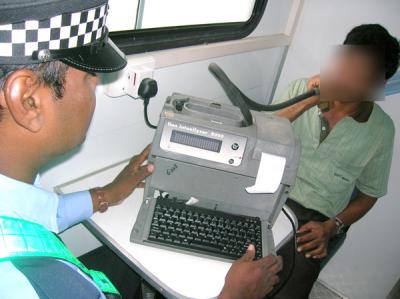Le full bench de la Cour suprême a renversé hier sept jugements en appel. Le contentieux portait sur l’éthylomètre de la police. Selon Indurlall Sunkur, qui contestait sa condamnation, l’utilisation de cet appareil serait illégale. Par ailleurs, le Directeur des poursuites publiques a fait appel de l’acquittement de sept autres personnes.
Le full bench, composé du chef juge Bernard Sik Yuen, des juges Asraf Caunhye et Benjamin Marie Joseph, a indiqué que le breath test n’est qu’un test préliminaire pouvant donner lieu à des examens approfondis. La Cour suprême a écouté huit cas en appel hier, soit la condamnation d’Indurlall Sunkur et sept acquittements.
Le DPP avait fait appel de l’acquittement d’Imran Toophany, de Runganaden Naeck, de Rita Jason Roudy, de Amit Kumar Ramsurrun, de Tivilen Bhowany, de Ranjit Kokil et d’Henrazsing Bekarma. Indurlall Sunkur contestait, lui, l’utilisation de l’éthylomètre lors des tests d’alcoolémie car l’appareil n’avait pas encore été homologué au moment des faits. Il a été homologué après publication dans le Government Gazette n ° 97 du 23 octobre 2010. À cela, le DPP a indiqué que la Cour pouvait se baser sur d’autres preuves concluantes telles que le rapport du Forensic Science Laboratory.
Indurlall Sunkur a soutenu qu’après avoir été arrêté par la police, il lui a été demandé de souffler dans un ballon (alcootest) afin de vérifier s’il avait consommé de l’alcool. Ce test s’étant révélé positif, il a été transporté à l’hôpital où un échantillon de sang a été prélevé à des fins d’analyses.
« The roadside breath test under section 123G is but a facility provided to the Police to obtain some preliminary indication that a driver is likely to have partaken alcohol beyond the prescribed limit — It is merely a facilitating tool and not a mode of proving the commission of the
offence. The requirement that the device be an approved one is merely to ensure that the police acts on the basis of a reliable device so that there is optimum efficiency in any follow up exercise at the hospital in the test which is carried out before a medical officer », lit-on dans le jugement. Les juges se sont appuyés sur la loi française de février 2012 qui rend obligatoire la possession d’un éthylomètre par les conducteurs afin de les encourager à mesurer eux-mêmes leur taux d’alcoolémie. Ils ont ainsi fait ressortir que même si le breathalyser n’avait pas été homologué au moment des faits, ce sont les résultats concluants du FSL qui n’ont pas été contestés en première instance. « As we have already said, the roadside test is but a preliminary test and it could be done through the breathalyser or the standing/sitting equilibrium test. Even if the breathalyser test were faulty for lack of prescribed equipment at the time, the one essential test which carries probative value in each of the present cases is the blood test carried at the Forensic Science Laboratory. If the Kuruma (supra) principle were to be applied there is no doubt that the only reasonable and sensible way to exercise judicial discretion by the trial Court would have been to admit the FSL evidence which was not challenged in any of the seven cases which are being appealed by the Director of Public Prosecutions. »
Le full bench, a dès lors, maintienu la condamnation d’Indurlall Sunkur. S’agissant des sept autres cas, la Cour suprême a cassé avec renvoi le jugement rendu.
CONDUITE EN ÉTAT D’IVRESSE : Sept jugements renversés hier
- Publicité -
EN CONTINU ↻


